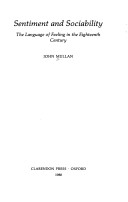Clarendon Paperbacks
1 total work
This is a study of the rise of the novel in the mid-eighteenth century, which was also the rise of sentimentalism - a fashion for the celebration of extreme sensibilities. While the fondness for sentiment embarrassed later literary criticism, it originally legitimated a morally suspect phenomenon: the novel. This book describes that legitimation and looks beyond novels in an attempt to understand sentimentalism as the expression of a culture's anxiety about the nature of social relations. A language of feeling is shown to be the resource of philosophers like David Hume and Adam Smith, as much as novelists like Richardson and Sterne. In fiction and philosophy it speaks of a perceived lack of contact between private and public expressions of sociability. To understand how this perception leads novelists to associate virtuous feeling with disabling suffering, the work also looks at 18th century discussions of nervous disorder where, as in many novels, sensibility becomes illness. In the connection between fiction and other examinations of the private self, sentimentalism is seen as the symptom of a civilization's deepest discontents.
The work is designed to be of value to scholars, graduates, undergrates studying eighteenth century English literature - particularly the novel, some social historians and historians of philosophy.
The work is designed to be of value to scholars, graduates, undergrates studying eighteenth century English literature - particularly the novel, some social historians and historians of philosophy.
